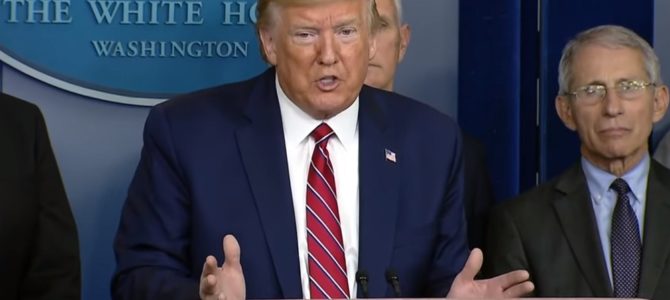
Not all of President Trump’s early coronavirus briefings have been down-to-brass-tacks. Many, however, were appropriately focused, calm, and dry — for the most part. It’s a tone befitting the perilous moment at hand, and largely what helped convince the public that Trump was capably shepherding the nation through this crisis.
The briefings are a net benefit, putting the president in front of the press every day, forcing him to answer for his administration’s response to the crisis. It’s hardly what’s important right now, but I do think Trump’s approval rating has benefitted from a briefings bump. He seems to agree. That said, to sustain the bump and keep the political class focused on what matters, Trump’s briefings should stick to business.
The corporate media is not treating Trump fairly. The president is right that Democrats were slow to acknowledge the gravity of the Wuhan virus as well. Trump has never pulled punches, and that’s part of what explains his success in politics. Now, with lives lost and the economy teetering, he should at least save those punches for Twitter, and keep the briefings focused.
That will, of course, be made difficult by corporate reporters eager to distract with unsubstantiated questions about racism, or trivial matters of palace intrigue. But aside from keeping the broader national conversation on track, Trump will look better for taking the high road, which can still involve pushing back against dumb questions, but maybe without calling reporters disgraceful. Such dust-ups create secondary storylines that further polarize people. Don’t play their game.
This is a recommendation made with humility; Donald Trump is president and I was pretty sure Hillary Clinton would win in 2016. I don’t presume to know better than he does. I do, however, think his early briefings were better for the country and, yes, better for his ratings than the briefings over the last few days, which have been less focused on the basic information people need, which is not entirely his fault.
I don’t think veering into spats with reporters is what sick, grieving, furloughed, or out-of-work Americans want to see the president do from the White House podium. Fair as it is, I don’t think the briefings are the place to point out Democrats’ slowness to take the virus seriously either. In times of crisis, people are more interested in policy and progress than partisanship, and many will receive a sober performance from Trump eagerly.
As The New York Times reported in late March, “a notable twist in polling at this point is that independents are driving Mr. Trump’s bump in approval, and some increased Democratic support is a factor as well.” A reasonable theory is that Trump’s more sober early briefings projected an image of leadership and strength that appealed to uncertain Americans even beyond the Republican base.
I don’t want to litigate the political expediency of Trump’s aggressive communications strategy. That’s a different conversation. But I do think we’ll all be better off, Trump included, if the briefings are concise, focused, and data-centric. Give us the data, let the doctors speak, allow the press to push for answers to key questions. Keep the public abreast of important information and give the media an opportunity to grill the administration. Extraordinary times demand extraordinary responses.









